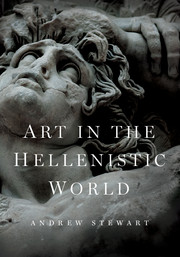Book contents
- Frontmatter
- Contents
- List of Illustrations
- Preface
- Introduction
- 1 Settlement
- 2 Power
- 3 Victory
- 4 Benefaction
- Focus I The Great Altar of Pergamon
- Focus II Hellenistic Mosaics
- Appendix A The Artist
- Appendix B Kallixeinos of Rhodes on the Wonders of Alexandria
- Glossary
- Timeline
- Biographical Sketches
- Select Bibliography and Further Reading
- References
- Sources of Illustrations
- Index
3 - Victory
Published online by Cambridge University Press: 05 October 2014
- Frontmatter
- Contents
- List of Illustrations
- Preface
- Introduction
- 1 Settlement
- 2 Power
- 3 Victory
- 4 Benefaction
- Focus I The Great Altar of Pergamon
- Focus II Hellenistic Mosaics
- Appendix A The Artist
- Appendix B Kallixeinos of Rhodes on the Wonders of Alexandria
- Glossary
- Timeline
- Biographical Sketches
- Select Bibliography and Further Reading
- References
- Sources of Illustrations
- Index
Summary
As we have seen, Alexander changed the arts of power forever. In addition to immortalizing him in every major medium, Greek sculptors and painters soon employed at least five basic scenarios to showcase him and his exploits: battles (Figures 3, 37), hunts, processions, marriages, and “pageants” that paraded him alongside gods and personifications in order to frame, contextualize, and universalize his achievements.
Although such scenes were old favorites in Greece, typically they had tended to minimize, or even suppress, individual achievement in favor of the collective and the generic. Hellenistic ones, by contrast, celebrated a single, omnipotent personality – the king – and thus took on new significance. Above all, these military monarchs needed divine favor, victory in war, and viable heirs. These five scenarios neatly fit the bill.
Just as Alexander’s city foundations, attendant cults, and portraits anchored his name and fame in the landscape of his empire, and his coins circulated his renown throughout the civilized world, these sculptures and paintings concretized, publicized, and applauded his achievements, complementing the writings of the historians and poets. Recognizing a good thing when they saw one, and wrestling with the tumult that Alexander had left behind, his successors eagerly embraced all of these practices, as did the Romans when eventually they inherited his legacy of empire.
- Type
- Chapter
- Information
- Art in the Hellenistic WorldAn Introduction, pp. 67 - 85Publisher: Cambridge University PressPrint publication year: 2014



